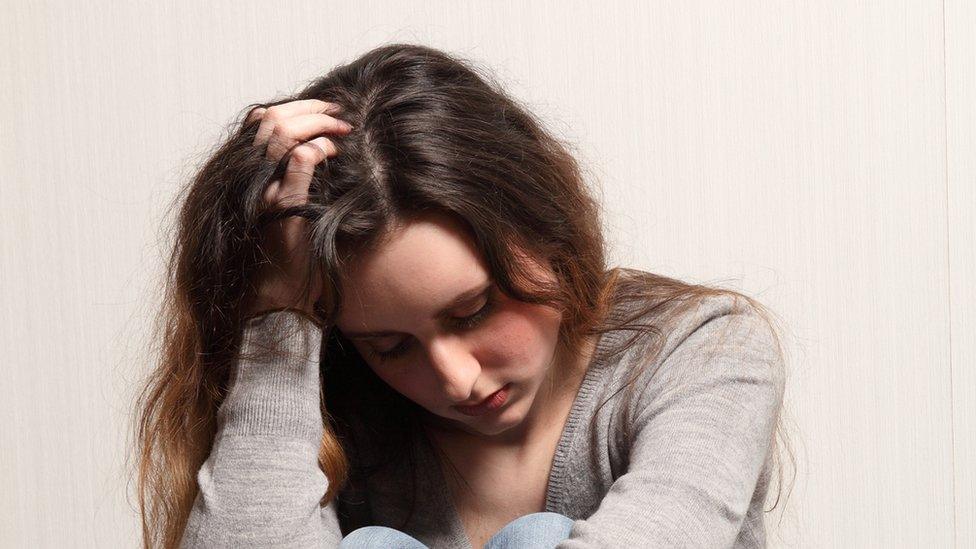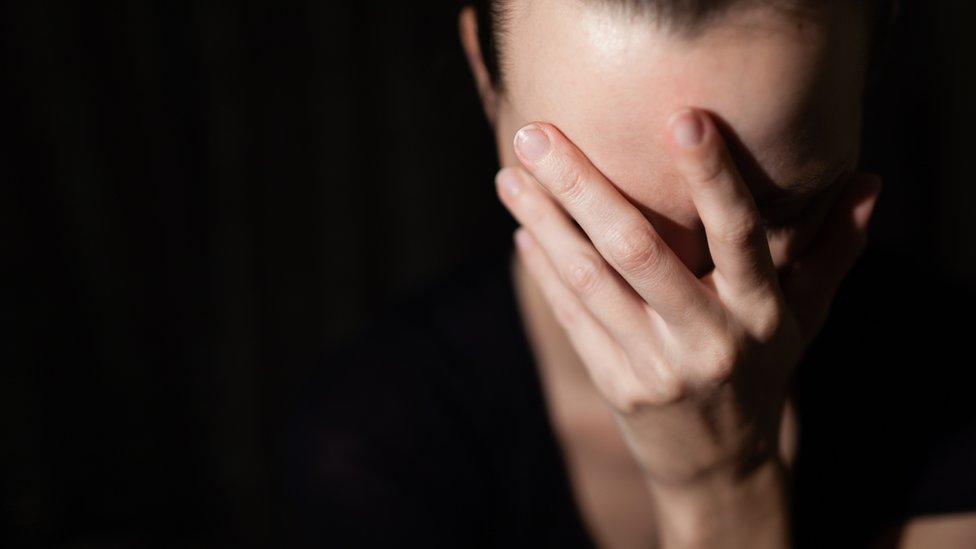Scots children make 934 'suicide calls' to Childline
- Published

Childline received more than 900 inquiries from children in Scotland contemplating suicide last year, according to a new report.
The NSPCC, which runs the helpline, said it dealt with record levels of calls on the issue from across the UK.
It received 934 calls and online inquiries from suicidal youngsters in Scotland - an average of 18 a week.
In many cases, counsellors were so concerned about their callers' welfare, they alerted the emergency services.
Childline's annual report reveals that calls from young people reporting suicidal thoughts have more than doubled in five years.
A turbulent home life, abuse, school pressures and mental health problems were all major triggers for suicidal thoughts, it found.

Ashley Agnew from Glasgow was ten when her big brother Gary took his own life in 1998.
'Never the same' - case study
Ashley Agnew from Glasgow was 10 when her big brother Gary took his own life in 1998. He was 12. Eighteen years later, Ashley is working with ChildLine in the hope that sharing his story will help other children.
"He was just a normal boisterous boy. He was fun, happy and always up to mischief, but he was happy," she told BBC Scotland.
"We were inseparable most of the time. We would have our fights obviously, but from a very early age Gary became like my protector.
"He was always doing things for me and that was the way it was until he passed."
Read more: Life 'never the same' after brother's death

The NSPCC said there was a "chronic shortage" of professional help across the UK for children suffering with mental health problems.
Many children are being forced to wait until they reach crisis point and the only place they can turn is Childline, the charity added.
Elaine Chalmers, Childline in Scotland's service head, said: "We have to understand why so many children are reaching such a desperate emotional state that they feel they have no option but to end their lives.
"As a society, we cannot be content that a generation of children feel so worthless, alone and cut off from support.
"It is up to all of us to help them feel that life is worth living.
"Children shouldering mental health problems often feel left in the shadows, their pain is not obviously visible and their injuries cannot be mended with bandages.
"We must listen to them, find out what is troubling them, and help them overcome their problems."
The NSPCC's It's Time campaign is calling on governments to invest in services to ensure all abused children receive the right support to prevent them developing mental health conditions.


'I'm not sure I could ever be happy again'
One 16-year-old girl, who contacted counsellors in Glasgow, said: "I don't know why I am like this, but one minute I feel like I want to die and the next minute I don't.
"I have my exams coming up soon and I'm really stressed and down.
"I feel like I am going to fail and people will be disappointed in me.
"I have been self-harming because I'm so angry and it helps me release everything. I'm scared I'm going to do something."
Counsellors in Aberdeen took a call from a 15-year-old girl who said: "I have had suicidal thoughts for a while now and sometimes I self-harm.
"I'm not sure I could ever be happy again. I just feel empty and like there is no way out.
"I don't have any confidence; I'm really nervous around people and hate the way I look.
"Sometimes I think people are laughing at me."

Stuart Jacob, a member of the Scottish Children's Services Coalition, said Childline's report is evidence of an "epidemic" in mental health problems for children and young people.
Earlier this week new statistics revealed that more children and young people in Scotland are being seen by mental health professionals.
In 2015, 19 young people, aged between 10 and 19, took their own lives., external
Mr Jacob, who is also a director of Falkland House School in Fife, said: "There is a chronic shortage of support and we desperately need to invest more in the face of greatly increased demand, with greater investment in prevention and early intervention, preventing such thoughts going on to have a significant and potentially fatal impact. "
He added: "If we are to give our young people the best possible start in life, we need to provide those requiring it with the care and support they so vitally need, when they need it."
Mental Health Minister Maureen Watt said the Scottish government took the mental health of young people very seriously.
She said: "We have doubled the number of child and adolescent mental health service psychology posts and are investing an extra £150m in mental health over five years.
"The average wait for a CAMHS [Child and Adolescent Mental Health Services] appointment in Scotland is ten weeks.
"However, in urgent cases like this where a child was experiencing suicidal thoughts we would expect them to be seen as a priority.
"We continue to support the vital service that Childline offers and this year provided nearly £200,000 to help them meet growing online demand."
The phone number for Childline , externalis 0800 1111.